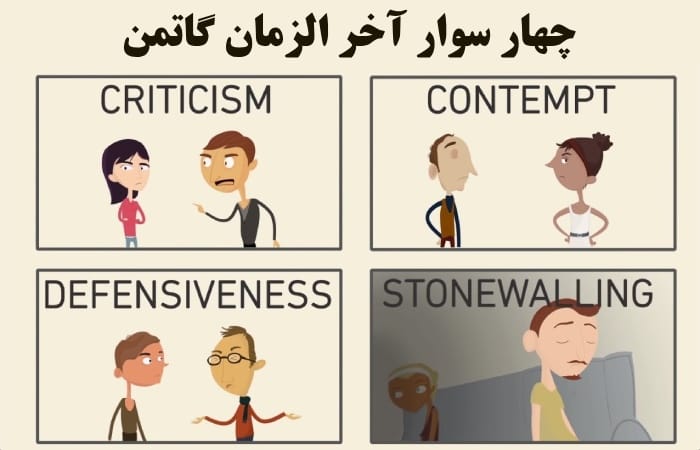
Blog
The Four Horsemen of the Apocalypse

In the field of social sciences, particularly in psychology and counseling, the concept of the “Four Horsemen of the Apocalypse,” introduced by Dr. John Gottman, is recognized as an analytical model for understanding and analyzing the dynamics of human relationships, especially in the context of marriage and romantic relationships. These four horsemen represent behaviors and communication patterns that can lead to the deterioration of relationships. Through a detailed examination of these patterns, Dr. Gottman has identified factors that contribute to tension, misunderstanding, and ultimately, the collapse of relationships. This theory aids in better understanding destructive behaviors in relationships. This article will provide an overview of the Four Horsemen of the Apocalypse and their impact on the quality of emotional relationships, emphasizing the importance of recognizing these patterns in enhancing individuals’ mental and emotional well-being.
فهرست عناوین
ToggleThe Four Horsemen of the Apocalypse
Gottman’s method, based on decades of research and empirical studies, is recognized as one of the most reliable approaches in the study of couples’ relationships. John Gottman, along with his colleague Robert Levenson, has conducted hundreds of empirical studies with over 3,000 couples over more than 40 years of scientific activity. These studies include a series of longitudinal studies that have identified key behaviors of successful couples, as well as those that lead to separation.
By analyzing data from these studies, Gottman developed a method aimed at improving relationships and reducing conflicts between couples. He claims that he can predict with 90% accuracy whether a couple will stay together or not.
In this context, Gottman identified four negative behaviors, which he refers to as the “Four Horsemen of the Apocalypse.” These behaviors include contempt, criticism, stonewalling (withdrawal from interaction), and defensiveness. The presence of these behaviors in couples’ relationships can significantly increase tension and ultimately lead to separation. The following is an overview of these four negative behaviors:

Contempt
“If Gottman observes that one or both partners in a marriage are engaging in contempt toward each other, he considers this behavior to be one of the most important signs of serious problems in the relationship.”
Contempt in human relationships can have very severe consequences. Disrespecting and mocking others, whether in a sarcastic or direct manner, is considered a form of contempt. Behaviors such as hostile humor, using an insulting tone, mimicry, and negative body language like eye rolling and mocking are all signs of contempt. These behaviors clearly indicate a sense of superiority and disgust toward the other person and can severely damage the quality of the relationship.
Contempt essentially communicates this message: “I am better than you, and you are less than me.” This type of behavior is one of the most dangerous threats to marital relationships. Contempt is, in fact, a series of actions and reactions that make the other person feel worthless. Examples of contempt include name-calling, cursing, and sometimes inappropriate jokes. People sometimes justify their jokes, even though these jokes may have a mocking nature that questions their partner’s character. Any behavior that diminishes the other person’s human dignity and causes them to feel discomfort can lay the groundwork for contempt. In other words, contempt is one of the most destructive behaviors that can end a relationship and should be addressed with great attention.
Suggested article: Relationship mistakes

Criticism
In the realm of interpersonal communication, one of the key points that John Gottman emphasizes is the topic of criticism and its impact on human relationships. The question may arise: how can individuals grow and develop a strong personality without criticism? Gottman believes that criticism should be done in a way that does not harm the character of the other person. Constructive criticism refers to criticism that focuses on a specific behavior and aims to improve the current situation. In contrast, if criticism is directed at the person’s character, it can damage relationships. Using destructive language can push criticism beyond the boundaries of constructive feedback.
Gottman suggests that, in the process of constructive criticism, it’s better to avoid using “you” statements, as these can lead the other person to feel blamed. For example, instead of saying, “You always ignore my family,” one might say, “I felt really upset today when I noticed you didn’t pay attention to my family.” This way of expressing personal feelings, rather than attacking the person’s character, helps create a space for dialogue.
Additionally, Gottman stresses that requests should be made clearly and specifically. Others cannot read minds and cannot automatically know what is bothering you. Therefore, it is essential to communicate openly and respectfully with your partner, clearly stating your desires. It’s also important to talk about the behaviors you dislike as well as the ones you appreciate, so the other person is aware of your preferences.

Stonewalling or Withdrawing from Interaction
Another destructive behavior that John Gottman refers to as a “relationship killer” is the act of shutting down or stonewalling, which involves refusing to communicate and withdrawing from conversation with the intention of creating distance between oneself and one’s partner. This behavior, also known as “willful silence,” can have deeply negative effects on relationships. During an argument, this type of behavior not only leads to frustration and harm to the relationship but also reduces the couple’s ability to resolve conflicts and engage in intimate interaction.
This behavior blocks effective communication, and as a result, severely limits the possibility of problem-solving and repairing the relationship. Stonewalling is often used as a tool to control the other person, but this type of control can ultimately have serious negative consequences for both parties.
One of the harms of stonewalling or creating a “stone wall” is that it eliminates the possibility of repairing human relationships. The longer the silent treatment lasts, the harder it becomes to return to the previous state and repair the relationship. In Gottman’s research, this phenomenon is described as a toxic poison for relationships, highlighting the importance of maintaining effective and intimate communication to preserve and strengthen interpersonal bonds.
Suggested article: Marriage counseling

Defensiveness
The final behavior in Gottman’s theory refers to defensiveness, which is defined as a tool for self-protection. The use of defensiveness usually leads to the destruction of relationships. In this process, instead of addressing our own weaknesses, we attempt to blame the other person and direct the criticism toward them. This type of behavior, especially when it leads to justifying and defending oneself, can have deeply negative effects on relationships.
Gottman makes an interesting point in this regard: when using defensiveness, an individual may take on the role of the victim and present their situation in a way that makes others appear guilty. This behavior not only prevents an apology and the effort to repair the relationship but may also lead the person to attempt to pressure their partner by highlighting their weaknesses. In this way, the “victim” presents themselves as innocent, making the other person appear as the “villain,” transferring feelings of guilt and discomfort to them.
These types of mechanisms not only prevent the resolution of existing issues, but over time, tensions and problems become deeper, possibly leading to a situation where returning to the previous state is impossible. Therefore, it is crucial to be aware of these mechanisms in interpersonal relationships and to make efforts to manage emotions and behaviors correctly in order to establish healthier relationships.
Gottman asserts that every problem should be resolved through proper, clear, and respectful communication. In other words, individuals should use the power of expression and words to address and solve issues effectively. This approach prevents problems from remaining unresolved and turning into larger challenges in the future. Ultimately, Gottman mentions that sometimes couples may reach a point where solving a specific problem seems impossible. Awareness of such problems that cannot be solved can help strengthen the couple’s relationship and reduce tensions between them. Life is short, and spending time in conflict not only is unproductive but also prevents us from fully enjoying life’s moments.
برای مشاوره رایگان و رزرو وقت (یا اگر تماس گرفتید و قادر به پاسخگویی نبودیم) شماره تماس خود را وارد کنید. ما به زودی با شما تماس می گیریم!



